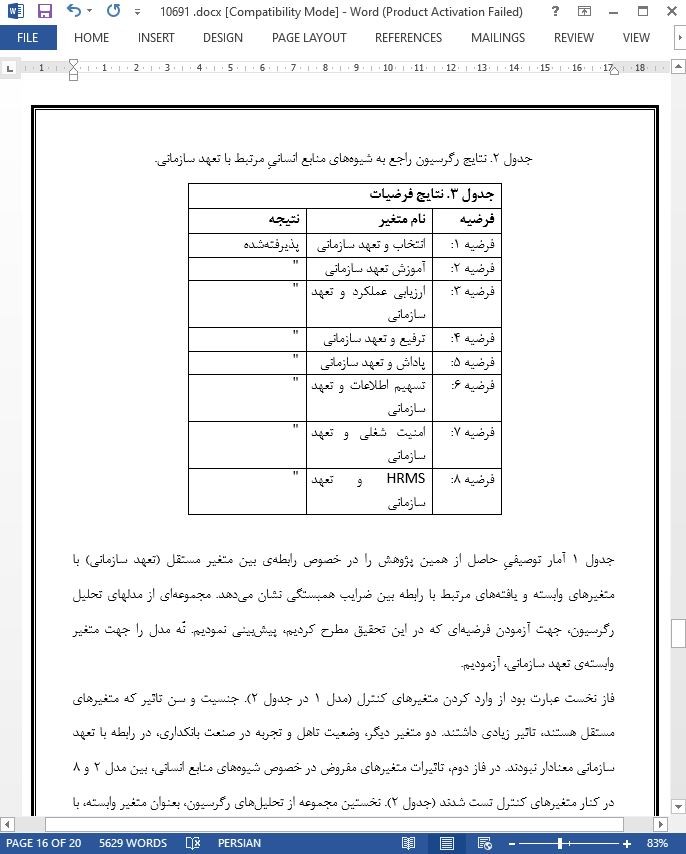
تحلیل رابطه بین شیوه های مدیریت منابع انسانی و تعهد سازمانی
چکیده
هدف این پژوهش، ارزیابی اثرات شیوههای مدیریت منابع انسانی بر تعهد سازمانی –بهتنهایی و بصورت نظاموند-میباشد. این دیتا از 304 مشارکتکننده در شهر اسکیشهرِ ترکیه گردآوری گردید که در صنعت بانکداری مشغول به کار بودند. بدین منظور، از یک نظرسنجی در بانکهای مختلف شهر اسکیشهر استفاده کردیم. جهت تحلیل رابطه بین متغیرهایی که در این پژوهش گنجاندهایم، از همبستگیها و آمار چندرگرسیونی استفاده کردیم. یافتههای این پژوهش، از متغیرها پشتیبانی میکند و یافتههای مطالعات پیشین نیز از این متغیرها پشتیبانی میکنند (متغیرها عبارتند از: انتخاب، آموزش، ارزیابی عملکرد، ترفیع، پاداش مبتنی بر عملکرد، تسهیم اطلاعات، امنیت شغلی و سیستم مدیریت منابع انسانی). همانطور که یافتههای حاصل از این پژوهش نشان میدهد، شیوههای مدیریت منابع انسانی، بر تعهد سازمانی –چه بهتنهایی و چه نظاموند- تاثیر میگذارد. این یافتهها به افقهایی جدید در مباحثی دست یافتهاند که از کاربرد شیوههای مدیریت منابع انسانی در صنعت بانکداریِ اسکیشهر دفاع میکنند.
1. مقدمه
از آنجاکه سازمانهای خدماتی، سازمانهایی کاربَر یا کارمحور هستند، کارآیی شیوههای مدیریت منابع انسانی و تعهد سازمانیِ کارکنان، بسیار حائز اهمیت است. یکی از مهمترین و تغییرپذیرترین منابع در سازمانهای بانکی که درون صنعت خدمات قرار دارد، کارکنانش میباشند و عملکرد و بهرهوریِ کارکنان یکی از عاملهای برتر در تاثیرگذاری بر موفقیت سازمانی میباشد. برای اینکه کارکنان عملکرد و بهرهوری بالایی داشته باشند، باید رضایت شغلی داشته باشند. شیوههای منابع انسانیِ راهبردی (SHRM)، بر اساس عملکرد سازمانی و رفتار کارکنان بنا نهاده شدهاند یا بعبارتی شیوههای منابع انسانی، سالهاست که یکی از موضوعات مطالعاتیِ برتر در جهان در حال توسعه بوده است. تعداد بسیار معدودی پژوهش راجع به شیوههای منابع انسانی در کشورهای در حال توسعه انجام گرفته است. این پژوهشها به واکاوی و بررسی شیوههای مدرن مدیریت و تحقیق منابع انسانی میپردازند.
3. روش
روشهایی را که جهت آزمودن فرضیاتی بکار رفتهاند که مبنای نظری روابط پیشنهادی تلقی میشوند، در ادامه توضیح دادهایم: یک نظرخواهی راجع به شیوههای منابع انسانی و تعهد سازمانی تهیه کردیم. سپس این نظرخواهی را در گروهی به بحث گذاشتیم تا عدم قطعیتهای احتمالی را تصحیح کنیم. رویهمرفته، 450 برگهی نظرسنجی در خصوص شیوههای منابع انسانی و تعهد سازمانی، میان پرسنلی توزیع شدند که در بانکهای مختلف دولتی و بخش خصوصی مشغول بکار بودند. این برگههای نظرخواهی را شخصا و با خودکار پر کردند. مشارکتکنندگانِ در نظرسنجی، داوطلبانه در نظرخواهی شرکت کردند و زمان کافی جهت تکمیل فرمها در اختیارشان گذاشتیم. فرمهای پُرشده را در یک یا دو روز جمعآوری کردیم. فرمهای نظرخواهی از 315 کارمند گردآوری گردید و 204 مورد از آنها مورد ارزیابی قرار گرفت (11 فرم را به دلیل ناقص بودن پاسخها کنار گذاردیم). نسبت مشارکت در نظرخواهی برابر با 67.5% بود.
Abstract
The aim of this study is to evaluate the effects of human resources management practices on organizational commitment, singly and systematically. The data was gathered from 304 participants in Eskişehir, who work in the banking industry. For that purpose, a survey study was conducted in different banks in Eskişehir. To analyze the relationship between the variables included in the study, correlations and multiple-regression statistics were used. The findings from the study support the variables (choice, training, performance evaluation, promotion, performance-based rewards, information sharing, job security and human resources management system) and these variables are also supported by findings of previous studies. As findings from this study depict, human resources management practices have an effect on organizational commitment both singly and systematically. The findings obtained open new horizons in discussions that defend the unification of human resources management practices in the banking industry in Eskişehir
1. Introduction
As service organizations are labour-intensive organizations, the efficiency of human resources practices and the organizational commitment of the employees is very important. One of the most important and variable resources in banking organizations which are located inside the service industry are the employees and the performance and productivity of employees is one of the top factors influencing organizational success. For the employees to show high performance and productivity depends on their job satisfaction. The strategic human resources practices (SHRM) founded on organizational performance and employee behaviour, or colloquially human resources practices, has been one of the top study topics in the developing world for many years. (Delaney and Huselid, 1996; Huselid, 1995). There is a very limited number of studies about human resources practices in developing countries in general (Budhar and Debrah, 2001, quoted by Sing, 2004). The studies in the literature examine the modern human resources management practices and research.
3. Method
The methods applied to test the hypotheses which are considered the theoretical basis for the suggested relations are specified below: A survey has been prepared about HR practices and organizational commitment. This survey has later been discussed in the group to correct possible uncertainties. All in all, 450 surveys about HR practices and organizational commitment have been distributed to the personnel working in different banks in the government and private sectors. The mentioned surveys are surveys filled personally and with pen and paper. The participants were voluntary and had ample time to complete the survey forms. The completed forms were collected on the same or the next day. Survey forms from 315 employees have been collected and 304 of them have been evaluated (11 survey forms were not included because of missing answers) The survey participation ratio has been defined as 67,5%.

چکیده
1. مقدمه
2. شیوههای مدیریت منابع انسانی و تعهد سازمانی
3. روش
Abstract
1. Introduction
2. HRM Practices and Organizational Commitment
3. Method
- اصل مقاله انگلیسی با فرمت ورد (word) با قابلیت ویرایش
- ترجمه فارسی مقاله با فرمت ورد (word) با قابلیت ویرایش، بدون آرم سایت ای ترجمه
- ترجمه فارسی مقاله با فرمت pdf، بدون آرم سایت ای ترجمه
